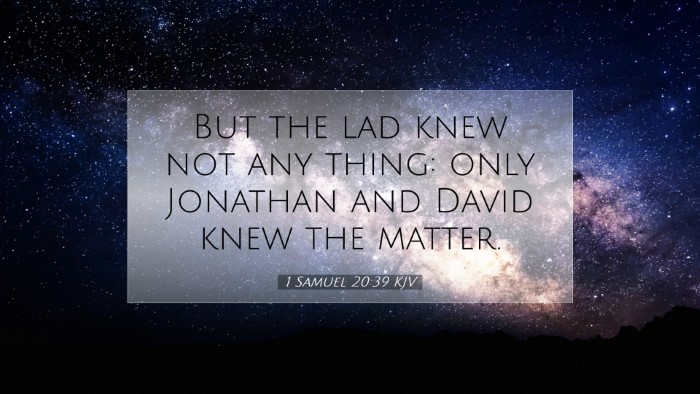Commentary on 1 Samuel 20:39
Verse: "But Jonathan knew not that his father had determined to slay David." (1 Samuel 20:39)
Contextual Analysis
This verse falls within a pivotal narrative of the relationship between Jonathan, son of King Saul, and David, whom Saul has begun to see as a threat to his kingdom. The events preceding this verse showcase the deepening conflict fueled by Saul's jealousy and David's rising popularity.
Jonathan’s loyalty to David is a hallmark of this biblical saga, illustrating the bonds of friendship that transcend family allegiances and political strife. This friendship is profoundly tested in the trials of kingship and succession.
Insights from Public Domain Commentaries
This portion of Scripture invites reflection on the themes of loyalty, friendship, and the complexities of divine providence. The commentaries by Matthew Henry, Albert Barnes, and Adam Clarke provide enriching scholarly insights into this passage.
Matthew Henry's Commentary
Matthew Henry emphasizes the tragic nature of Jonathan's ignorance regarding Saul's intentions. He notes that Saul's jealousy blinds him to righteous judgment — a common human folly. Henry further points out that Jonathan’s lack of knowledge reveals both his innocence and the extent of the danger surrounding David. He describes Jonathan as a "sincere friend" who is placed in a precarious situation, tasked with balancing familial loyalty against his moral duty to protect David.
Albert Barnes' Notes
Albert Barnes highlights the importance of this verse in understanding the dynamics of Jonathan's character. He notes, "Jonathan was not suspicious of his father's intentions." This reflects not just Jonathan's trust in Saul but also underlines his general disposition of goodwill. Barnes elaborates on the implication of Jonathan's unaware state, suggesting that it serves as a narrative device helping the reader appreciate the danger lurking around David, who remains unaware of the machinations against him.
Moreover, Barnes encourages readers to recognize Jonathan's nobility amid familial conflict, demonstrating an authentic bond of friendship that contrasts sharply with the envious spirit of Saul.
Adam Clarke's Commentary
Adam Clarke offers a more introspective approach, highlighting the passions and provocations that lead to such familial discord. He posits that Jonathan’s unawareness of his father's intent not only signifies his personal loyalty but also a deep trust in his father’s judgment, which is ultimately betrayed. Clarke keenly notes that this moment foreshadows the division that will ensue in the house of Saul as the narrative unfolds.
Clarke also reflects on the theme of divine intervention, suggesting that despite human ignorance, God’s plan unfolds providentially. While Jonathan is naively oblivious, God orchestrates the events leading towards David’s ascendant future.
Theological Implications
The examination of 1 Samuel 20:39 reveals critical theological themes pertinent to scholars and pastors alike:
- The Nature of Loyalty: Jonathan's commitment to David, despite his father's threats, exemplifies a profound moral dilemma, challenging readers to consider their own allegiances in the face of potential conflict.
- The Complications of Authority: Saul's authority is not solely challenged by David's potential kingship, but also by Jonathan's fidelity to David—teaching contemporary audiences about the complexities of leadership and personal ethics.
- Divine Providence amidst Human Conflict: The narrative suggests that God’s purposes prevail despite human ignorance and rivalries, offering reassurance to present-day believers about His sovereign workings.
Application for Pastors and Theologians
In delivering sermons or teachings on this passage, pastors might emphasize the relational dynamics between Jonathan and David, invoking the narratives of loyalty and betrayal that resonate within congregational experiences. The theme of tragic ignorance should be explored to encourage self-reflection about what one may be unaware of in their own spiritual and relational life.
Theologians might utilize this passage to engage in discourse about human free will versus divine sovereignty. The occasion serves as a reminder of how God’s plan often unfolds through human relationships and the choices we make therein.
Conclusion
1 Samuel 20:39 encapsulates the tension between familial allegiance and personal loyalty. The insights drawn from classical commentaries enrich our understanding of these complex dynamics, underlining the importance of integrity and moral conviction. As believers navigate their own relational labyrinths, the lessons embedded in Jonathan and David’s friendship offer both a mirror and guide for life in community.


